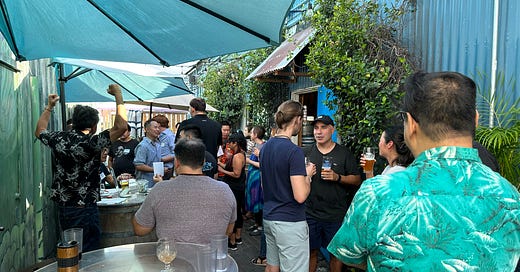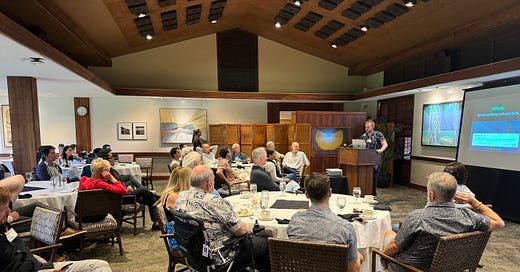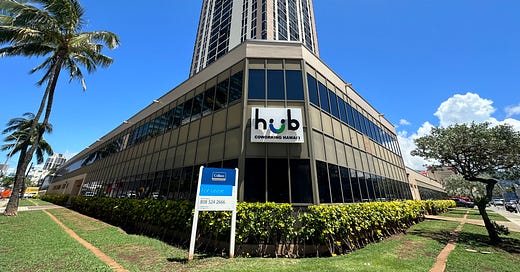
Peer News Outlines Local Focus
This morning, Pierre Omidyar's local news startup Peer News hosted a conference call with journalists to provide an update on their venture, which was first announced in November. Among the key announcements made was that John Temple was coming aboard as editor, and that they were planning to launch by April or May. The company will be posting the audio from the call later today, but as TechCrunch noted, details were scarce as to their business model, with Omidyar and Temple "playing their cards incredibly close to the vest."
Omidyar and Temple also conducted a Hawaii-only call to answer questions from the local media. "Obviously we're not talking business model and those type of things," Pierre warned, but the pair pulled back the curtain a little bit. I sat in on the call, and wrote up a rush transcript. It's incomplete, and likely contains errors, but will hopefully be of interest to my fellow newsies.
Erika Engle/Honolulu Star-Bulletin: "I wanted to ask Pierre or John how Ginx.com will factor into PeerNews, or whether that's a separate venture."
Pierre Omidyar: "Ginx was something that we did a little while ago to help us learn about the Twitter universe, the behavior of people there, sharing news with one another and having conversations around the news they were sharing. We saw that as an experiment, and we learned quite a lot, but we decided to shut down that service in December. Ginx is no longer in operation. We're devoting our technology efforts to the new news service we're hoping to launch in early Q2."
Erika Engle: "But I do imagine that social media will play a are role?"
Pierre Omidyar: "Certainly, Erika. The insight that we had early on was that a large majority of people actually get their news through social connections rather than traditional news outlets. That's one of the things we learned and confirmed with Ginx. It's very clear to see that social media is the primary way for a lot of people to be informed about the world and their communities. That's a key part of our strategy. When I say we're looking at a new way to do journalism online, it's that we're taking insights like that one."
Janis Magin/Pacific Business News: "The types of coverage you're talking about, civic and public affairs, how about business?"
Pierre Omidyar: "I'm going to turn it over to John in a second, we're just beginning to work together, and we're going to be developing the details of our coverage areas in the weeks to come. My first passion is civic affairs."
John Temple: "One view we share is that economics is critical to all our coverage areas. We will be covering business issues, but through a different prism. How public policy affects entrepreneurs, how decisions in government relate to the ability of businesses to thrive. It might not be the way you've seen business covered in the past, but we see money as important to any coverage."
Rick Daysog/Honolulu Advertiser: "What's the role of citizen journalists, or do they have one in this new model?"
Pierre Omidyar: "Obviously the public is at the center of this model, because it's about community. I've worked on some projects where citizens were the only content generators, they were the principle sources of content, and this will be more complex than that. But there's going to be a way for people to share their knowledge, and debate issues."
John Temple: "I'd say one of our greatest assets is that there is a large community of highly passionate and well informed amateurs, citizen journalists, who amateurs in designation, not skill. I have a lot of respect for the quality and impact of ordinary citizens when they engage in issues that they're passionate about. When they learn about issues, they can add substantially to the quality and depth of the conversation. So absolutely, they're going to be a part of what we do."
Karin Stanton/Hawaii 24/7: "A follow up question about coverage. Those of us on the outer islands know that Honolulu doesn't mean Hawaii. You guys are based in Honolulu. Will you expand coverage to include the entire state? Second part of my question... John, local sports sells local newspapers. Is there going to be a sports element in coverage? And how quickly are you going to be able to export this model to other communities?"
Pierre Omidyar: "Let me take the first part of that question about the neighbor islands. I'm very aware and sensitive to the fact that Honolulu is not Hawaii. There are a lot of issues and stories that are unique to the different neighbor islands and they merit focus, they need to be focused on. Having said that, as a startup operation based in Honolulu, our initial effort will have to center around the types of things that we can cover in that local community. It is the seat of the state government, and issues affect the entire state can be covereed effectively in Honolulu. As we grow and are able to provide a valuable service to consumers, we can expand that coverage into the neighbor islands. John, do you want to address the other parts?"
John Temple: "In terms of expansion, we'll have to see as we go. We can't speak to that at this point. There are a lot of issues we'll cover in Honolulu that will touch the lives of people all throughout Hawaii, and we'll be cognizant of that, but we'll start in Honolulu. On sports, sports is not going to be our core focus. There will be a way that we'll be sharing that kind of news, but I wouldn' be looking to us as a source for sports. The emphasis is on civic matters and public affairs, on building a better community. There are aspects of community life that will be reflected on the site, but are not the core of the site.
Karin Stanton: Are you in Hawaii yet? How's the weather where you are?
John Temple: "Not yet, but I will be soon."
Jason/Hawaii Business Magazine: "How many applications have you received, for assistant editors and reporters?"
Pierre Omidyar: "We just put the postings up 25 minutes ago, so that's brand new. I'll say that when we started our search for editor, which we concluded with John, we did receive a few hundred inquiries and we did manage to talk to a whole lot of folks. We are hoping looking forward to building out the team."
Jason: "A question on the website. What's it going to look like, what kind of tools? Like a blog? What's the presentation?"
Pierre Omidyar: "I think that's all still under development, and anything I told you today would change, that's the nature of startups. The web provides a very different platform for delivering news analysis, content, and conversation than exists offline. So we're going to be... some of it may not be apparent, but we'll be quite different from a traditional news operation The way you create the written content for the web is different than you do for other media. I think our primary objective will be to deliver real value to consumers, to help them understand whats going on in our community, and to debate and engage in civil conversation around the issues. There are a lot of great tools on the web that other people have innovated, and there's a lot of opportunity to do something interesting."
Jason: "How much do you think you'll be using video?"
Pierre Omidyar: "I'll let John address that in more detail, but we'll use whatever media we can to meet the mission. I think video plays a role, probably, but so does text and all forms of media."
John Temple: "We would like to look at it as, 'What's the best way to convey information?' Video is sometimes the best way and we should use it. But sometimes text is the best way. We'll try to be very smart about how we use different forms -- video, audio, text, photo -- to best serve the community."
Janis Magin: "Is it going to be spot news, enterprise, breaking news... how extensive?"
John Temple: "We'll provide a whole range of news types, but the emphasis of our staff will be on authoritative beat coverage in critical areas. And some of it will be breaking news because we know vehicles like Twitter are great for conveying breaking news, but the emphasis will be on enterprise and analysis. We believe we will be adding to the Hawaii, the Honolulu mix, more journalists, and more emphasis on in-depth reporting."
Janis Magin: "How many journalists?"
John Temple: "We're starting to build a small team. It will be a real newsroom. I don't want to get into the numbers yet, but it will be a sizable enough team to generate valuable original reporting."
Janis Magin: "The strategy was to provide local news, but how local? As you know, it has different definitions for Honolulu, for neighbor islands, as Karen ponted out... Will you be covering things like AP for a statewide, or for a worldwide audienc or a local audience?"
John Temple: "I think we're covering it for the local audience. Worldwide, there are going to be people... like Hawaiians not on the island, or people who care deeply about Hawaii, and we welcome their interest. But we want to provide coverage that we hope provides the basis for informed discussion and debate, and used to discover steps forward for Honolulu and Hawaii. We're not going to be a hyper local site. Not a neighborhood operation."
Janis Magin: "Right, so not traffic news or that local."
John Temple: "No, but transportation issues, and sometimes traffic, could generate a transportation story."
Pierre Omidyar: "I think at a high level the idea is to provide a set of tools to enable the community to better learn what's going on, understand, and debate the issues tha face our community. That's community-wide, local focus. And I want to emphasize that we're not looking to create a news product that's solely there to inform. One of the benefits of the web is engaging the community, providing value and serving their aspirations to have an impact. And so that should help paint the picture for you on the type of content and the audience."
John Temple: "It's always a challenge in Hawaii, neighbor islands, transportation... we want to set expectations properly. As a start-up organization, we're going to be based in Honolulu covering statewide issues. There'll be natural limits to what we can do on day one."
Rick Daysog: "Are there other models out there we can compare this to?"
Pierre Omidyar: "What's exciting in 2010 is that there are a lot of experiments going on across the country, and some models that are interesting. Having said that, the particular blend of that John represents and the community interaction that my background brings, that's something I haven't really seen executed in the way that I envision and that we'll try to execute in Hawaii. I think we're going to add a new voice and a new way to experiment."
Rick Daysog: "For example, the ProPublica model. Any similarities?"
Pierre Omidyar: "No, I don't think so. They're a great organization, a non-profit organization. And I'm commited to demonstrating with Peer News that a for-profit sustainable business operation can be an integral part of a community and can help people and meet aspirations in the community to make our home a better place. that's something that can be done, and ought to be done, as a business."
Vanessa/KHON2: "On news categories, you folks obviously said a lot about community and local issues. Would this be hard news? Where you'll have... you're not going to focus on sports, but, feature stories, international stories that may affect local residents? What are the categories?"
John Temple: "We're still developing those, but international stories that affect Hawaii, we could cover that in one of our beats. There's the context of trying to share with people what's going on elsewhere and what we can learn, and how we might approach something like state government or higher education. You should always learn from what others are doing. We want to provide a lot of context for what's happening in Honolulu. The journalists in this organization will be interacting with the community more than is typical than a traditional news organization. We're going to be in a daily conversation with people, talking with them. If you like to think of yourself as an informed friend, you actually do respond."
Vanessa: "Is every reporter that's hired be equipped with a phone that can take pictures, Twitter, social m edia... how will they be able to, out in the field, how will that work in order to get it onto the website?"
Pierre Omidyar: "I really hope so. These tools are very powerful, as you know, it's amazing what you can do with your iPhone or other mobile phone. We've come a long way from the telegraph, so we're going to be using those tools."
John Temple: "We'll be looking at what the right tools are."
Jason/Hawaii Business Magazine: "Hawaii is influenced by outside forces. Will you have correspondents in Washington, or San Francisco?"
John Temple: "I don't think we've made that decision yet. You make a great point, and how we would do that is something we still have to explore. There's no decision on that kind of thing, except that you make a valid report and there are different ways to do what you're describing."
Jason: "Do you feel that investigative reporting in this town is lacking? Is that why you're starting this venture?"
John Temple: "That is not the impetus for creating the venture. I hope you can hear in Pierre's voice his commitment, and what attracted me to be a part of this. To build a new news service that took advantage of contemporary technology, without worrying about what was done in the past, to help a community come togeter to learn more about itself and to participate more in a democracy. This is a fundamental first-amendment issue. What is the role of the press? To help citizens act in their best interest, with knowledge to go forward. That's why I want to be a part of that. Investigative reporting is one of those things -- we're not stenographers or receivers, we try to inform people and anticipate the questions people should ask or are asking."
Pierre Omidyar: "Thanks everyone for joining us."
John Temple: "I look forward to meeting you all, it's been a pleasure meeting you all over the phone."










